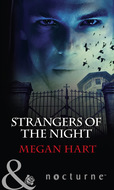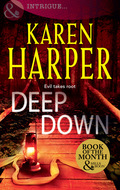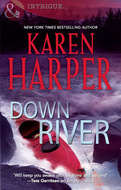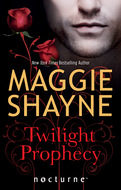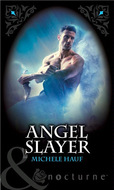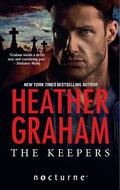Das Buch kann nicht als Datei heruntergeladen werden, kann aber in unserer App oder online auf der Website gelesen werden.
Buch lesen: "The Hunted"

Beth snaked her arms around his neck and gave in to the impulse she had been fighting all day—to touch her lips to his.
The moment she did that, he let out a moan deep in his throat, his fingers fumbling, and a touch wasn’t enough. Her mouth claimed his, tongue dipping inside to discover that he did, as expected, taste of warm salt and sea-spray, and something else that she couldn’t identify, but immediately wanted more of. This was her dream, all of her dreams recently, only even better.
About the Author
ANNA LEONARD is the nom d’paranormal for fantasy/horror writer Laura Anne Gilman, who grew up wondering why none of the characters in her favorite Gothic novels ever seemed to know a damn thing about ghosts, vampires, or how to run in high heels. She is delighted that the newest generation of heroines has a much better grasp on things. “Anna” lives in New York City, where either nothing or everything is paranormal.
Both can be reached via: www.sff.net/people/lauraanne. gilman or http://cosanostradamus.blogspot.com.
THE HUNTED
ANNA LEONARD

MILLS & BOON
Before you start reading, why not sign up?
Thank you for downloading this Mills & Boon book. If you want to hear about exclusive discounts, special offers and competitions, sign up to our email newsletter today!
Or simply visit
Mills & Boon emails are completely free to receive and you can unsubscribe at any time via the link in any email we send you.
Dear Reader,
My family spent many summer vacations along the Massachusetts coast, and the sound and smell of the ocean is one of my strongest memories even now. When the idea of a selkie hero came to me, the decision to set the story on the Cape was a no-brainer. Of course, that also meant that both my hero and heroine are of the staunch Yankee breed—occasionally (often) too stubborn for their own good, but fierce when the ones they love are threatened.
Any passing resemblance to family members may not be entirely coincidental …
Laura Anne Gilman
For Amy and Larry
Prologue
Miles away, in another world, a young male in his prime leaned back, and thought about a woman.
He didn’t know her name. Or what she looked like. Or the sound of her voice or her favorite foods. He didn’t know anything about her, not even that she, specifically, existed. But he woke one morning to the sound of rain on the water, and couldn’t stop thinking about her.
The obsession was hard on him, shadowing his every move, every hour of the day, filling his thoughts, and he didn’t know what to do about it.
He rolled over on his side and stared out over the ever-moving surface of the sea. No, that wasn’t the truth. He knew exactly what to do about it. He just didn’t want to.
Life was good, right now. The outcropping of rock was warm underneath him, his sleek, powerful muscles slack and relaxed after a day of hard swimming, and the ocean spray tingled on his bare skin, milky-pale despite the hours spent exposed to the elements. He could stay here all day, sleep out under the cool wind and bright stars. Or he could swim back home to the little village where his family lived, the comfortable cottage where there would be fresh-caught fish on the table, and a squabble of nieces and nephews to wrestle with, and the pleasure of a new season of warmth and life to celebrate on this first full week of spring.
Life was good. On any other day, any other time of his life, he would be content with the gifts he had been given, to be alive and healthy and surrounded by everything he could possibly want.
But now something tingled in his blood, making him restless and moody. Not just this day: all week, ever since the equinox. Life might be good, but he wasn’t sleeping, wasn’t satisfied with the way anything tasted, wasn’t taking pleasure in anything that he normally enjoyed. Even his temper, normally even and calm, was frayed and ragged.
His blood-kin abandoned him first, shaking their heads and rolling their eyes at his growls and twitches, telling him without words that they wouldn’t put up with his behavior. His seal-kin lasted longer, their patient eyes and soft plush fur giving comfort until his increasing discomfort drove them away as well, searching out other places to bask in the spring sunshine and leaving him alone on the rock.
He knew what was wrong. Or rather, what was right. Even if he hadn’t observed it in others, instinct would drive him. The temper, the frustration, the desire to pick a fight with his nearest and dearest … He needed to mate.
No, that wasn’t accurate. He’d been through lust before, and this was … more. He needed to find the female who would stay with him, not for a night or even a season, but forever.
Somewhere out there, this woman existed. The simple fact of her being was firing his blood, making him dream of her skin, her hair, the feel of her wrapped around him, of him fitting inside her so perfectly, body and soul …
All he had to do was find her, woo her, win her.
It was a simple enough thing, in theory. Not every seal-kin partnered for life—his own mother had several mates, one of them his father, and was on good terms with them all—but it happened often enough. Always the same way: an impossible pull, tugging the male to bend to its will until the female was found and won, wooed and well mated. But the others males always seemed able to find what—who—they needed among the blood-kin, the eight Families that made up this colony. If a mate was not there, they sometimes traveled north or south, to meet up with other colonies. Places that were known, were filled with familiar names and shared histories.
He didn’t feel a pull that way. He felt pulled westward. West, across the sea, toward the setting sun.
He covered his face with his arm, trying to block out the need. There were no colonies to the west that anyone knew of. Nobody had gone west in generations. He would not find what he needed.
That knowledge did not stop the pull, inexorable as the tides.
It felt wrong, to go against what was traditional. And he resented this pull his body had on him, when it wasn’t what he had been planning. He hadn’t even thought to take a breeding-mate for another few seasons, much less life-mating.
But his people trusted their instincts. Instinct was what kept them alive and free, even when other colonies were wiped out by Hunters, by pollution, by the slow eroding of their territories. Instinct, and not being too stubborn, too stupid to acknowledge simple truths.
So when the itch became too much, the need overwhelming, and the warmth of the rock no longer soothed, he slipped shoulder-first into the cold waters of the Atlantic, ignoring the storm clouds forming in the distant east, and, without a word of farewell to anyone, swam toward the pull.
Chapter 1
Beth Havelock was restless. She moved back and forth in her workroom, touching projects but not actually doing anything with them. The paper cutter was cleared off, the trash emptied, the work counter scrubbed, pens capped and sorted, to-file box filed down to the last proof sheet and invoice. Chemicals were sorted, the older ones pulled to the front of the darkroom’s cabinet, the newer ones pushed to the back. She even changed the batteries in all the smoke detectors in the house a week early, and then, still needing something to do, went back into her workroom on the first floor and rinsed out all of the extra developing trays, setting them to dry upside down on the counter. Still, she felt the need to be moving, doing.
Her bare feet scrunched against the cold tile floor, her toes flexing and releasing as though picking up the motion her hands were forbidden, the tension thrumming through her entire body, nose to toes.
“Good lord, what is it with you, woman?” Her voice echoed in the tile-and-chrome workroom, startling her even though she was the one who had spoken.
She was well ahead of her deadlines—waking early and restless did wonderful things to her to-do list, even if it was making her antsy beyond belief. Business was good right now, but not good enough to keep up with her sudden surge of energy, as though she had been mainlining energy drinks and chocolate rather than her usual healthy diet. Maybe she should switch to chocolate bars and soda for a week, see what that did for her.
“All that will do is give you zits like you were fourteen again,” she said, horrified by the thought. “It’s spring fever like usual, that’s all.” It wasn’t anything unusual for her, for all that it seemed more severe. She got like this every year, when the weather finally began to soften, and the days started getting longer. This winter had been a particularly rough one along the New England coast, and when they weren’t getting hit with surprisingly heavy snowfall, they were being battered by seemingly nonstop nor’easters. Waves and wind were nothing new to hardy Nantucketers like the Havelocks, but after several months of overcast white skies and the never-ending howl of the wind, that first day of spring, when the skies were blue and the air mild, could rouse even the most phlegmatic of New Englander into flights of relative fancy. And while Beth Havelock was many things from practical to responsible, she wasn’t phlegmatic.
She also wasn’t focusing at all. That really wasn’t like her. Normally, once she settled in to work she could shut out any distraction, not noticing anything except what she was doing. Today, even the sound of a bird singing outside was enough to break her concentration.
She sighed, moving away from the window and staring at the far wall. It was painted a darker white than the other walls, intentionally, to better showcase the photos mounted there. Her own work ran the gamut, from a traditionally posed wedding photo of a bride and groom, to three dolphins leaping in the surf, to a single lonely form standing on the rocks at night, like a human watchtower. She was a good photographer, although not good enough to make a living at it. Her technical skills were better than her artistic ones. But sometimes she caught just the right moment, like the photograph at the end that, no matter how many times she saw it, always caught her attention: a single harp seal, pulled up onto a shelf of rock, gazing up at her with sad eyes … and one flipper raised in what, in a human, would have been a rude gesture.
Even on bad days when everything was going to crap, that photo could always make her laugh. Today, instead, it filled her with a strange sense of wistfulness.
Giving in to her mood, she locked up the darkroom, put away her materials and, still barefoot, left the work space on the second floor of her Victorian-era home. That was the advantage to working for herself, rather than reporting to an office. Worse pay, longer hours, but moderately better perks, including the ability to work at 4:00 a.m.—or take off at 4:00 p.m. Rather than heading downstairs to the rambling porch and the enticements of the still-sleeping garden, however, Beth went up to the third floor, to the room at the end of the hall.
The room had been her mother’s workroom when Beth was growing up. The drafting table was still pushed up against the wall, but it was bare and empty. The pencils, papers and watercolors that used to clutter the space were long gone, as was her mother. The memories were there, but tucked away, out of daily reach. Now the room was simply something Beth walked through to get to the great wooden door set in the far wall.
That door led out to a narrow walkway running along the roof-edge of her home.
A widow’s walk, it was called. A platform, with waist-high rails all around, that circled the house’s two chimneys, and gave Beth an almost unobstructed view of the ocean beyond the boundaries of the small town of Seastone, Massachusetts.
She leaned against the railing, feeling the wind tangle in her sleek black hair and tie it into elf knots. When she was a little girl, her father would sneak her and her cousin up here. Her mother, working at her sketches, would pretend not to see or hear them as they crept, giggling, past her. They would watch the sailboats in the harbor, and the great fishing boats and tankers passing by much farther out in the green-capped waves.
Beth was older now, her family long gone, and her hair was cut short, above her shoulders, but the wind still tangled it in exactly the same way, as though a giant hand were tousling it.
And she still leaned against the railing of the widow’s walk and watched the boats slip by. Only now, rather than feeling a sense of history and contentment when she watched them, Beth felt her restlessness increase until it was an almost physical ache in her legs and arms.
Did everyone feel it, in the quiet pockets of the day when nothing else occupied their minds and bodies? Or was it just her, this strange echoing, like there was something scooped out and hollow inside, when the seasons shifted and the winds changed? She had almost asked friends and total strangers, time and again, when she was away at college in Boston, and after, when she came home, when this whimsical mood attached itself to her. Each time, something had held her back from actually saying something. Fear of an answer, perhaps. Of discovering that yes, it was only her. That only she felt it, and nobody else would ever understand.
Not that it mattered. Each time winter or summer came, the restlessness passed, and she found purpose and focus again.
“More of the same. Always more of the same.” And yet, even as she said it, trying to reassure herself, something deep inside told her that there was more to it this time than simple spring fever. Something that surged inside her like a tidal pool, swirling and wearing at her, matching the physical ache with a pool of longing for.
For what?
Beth didn’t know. This spring, for some reason, it was different. Stronger. More painful. Usually standing up here and watching the waves move on the surface of the ocean took the harsh edges off, and a bit of physical activity—a bike ride, a hike along the dunes—dealt with the rest, got her through until it went away.
She wasn’t so sure it would be enough, this spring.
Once, her father would somehow sense her mood and swing her by the arms, tossing her into the pile of leaves they had raked up on the sloping backyard, or a pile of new-mown grass. Her cousin Tal, nobody ever called him Talbot, would leap after her, and they would wrestle. her father would laugh so hard he had to sit on the ground to recover, and they would leap on him, and the restlessness would disappear, chased out and forgotten.
Had her father known the same restlessness? If he were still here, would he be able to explain it away, give her the way to deal with it, the words to explain it?
It didn’t matter. He wasn’t here. All gone: father, mother and Tal, her entire family gone in one split second on a rainy highway nearly fifteen years ago. She was the only one left. The one left behind. Would she feel this way, if they had been spared? Would the feeling of separation, of restlessness be soothed by their presence? Or would it have been worse, knowing for certain that there was no one out there who could understand?
A trill at her hip interrupted her morbid thoughts, and she flipped open her cell phone to answer it. “Jake, hi.” Jacob Brown—Jake to his friends, which some days seemed to include every person living in Seastone and the surrounding towns. Open-faced and blueeyed, with a row of freckles better suited to a ten-year-old and the physique of a high school quarterback.
Five years they had been dating, since the summer they both turned twenty-four and got drunk together while sitting on the seawall at midnight. It wasn’t a great love, but it was comfortable, and they knew what to expect from each other. Five years, and neither seemingly eager to move forward, or move away from where they were. Every month for the past year Beth had resolved to end it, and every month Jake agreed with her, and yet they still found themselves having dinner and sex on a regular basis.
There was a lot to be said for stability. For knowing what you would be doing each day, and each night, and with whom, and what was expected of you, and what you could expect of them. Sudden changes had never been good things, for her.
“We still on for dinner?” she asked him, giving in once again to habit.
“Maybe not tonight. Storm’s coming up, according to the screens. Looks like it might be a doozy.”
A storm might explain her mood. Storms did that to her, when they came in off the ocean. “You afraid of a little rain?” she teased, glad for distraction from her own distraction.
“More likely a lot of wind, which means we’re probably going to lose power on half the island.” Jake was a Realtor, and the property manager for a number of nearby summer homes. If anything happened, he was the guy who had to deal with it, while the owners were safe and dry on the mainland. “Anyway, you remember what happened the last time we went out in a bad spring storm, at, I might add, your instigation?”
She did. Unlike Jake, she still thought it was funny, smiling now at the memory. How many people could say that they got chased across a beach by an irate and very lost bull seal? It wouldn’t actually have hurt them—seals were peaceable creatures, as a rule, unless you got near them during breeding or whelping seasons—but Jake’s ego had apparently been bruised something fierce by the experience.
Beth’s smile widened. “Point taken, forgive me. All right, no rain-swept walks on the beach. So we’ll eat somewhere in town?”
“Look … can we make a rain check? Literally?” He sounded distracted now, and she could hear the clicking of computer keys in the background. He must be checking on his clients, probably scanning the weather networks, too. Multitasking always made him cranky.
Beth looked up at the sky, watching newly arrived clouds scud past, wispy white against the pale blue. It looked innocent enough, but she had grown up watching these skies, learning the warning signs. Storms could come up fast, even when it looked clear, especially in the spring. She should know that by now. “Sure,” she said, sighing. It wasn’t like it mattered, anyway. Dinner with Jake wasn’t going to do anything about her feeling of restlessness. It never did. That was part of the problem.
She listened to his agreement, then ended the call.
She didn’t want to reschedule. She didn’t want to have dinner with Jake at all, truth be told. She didn’t want a casual, comfortable dinner where they talked about things they had talked about for years, until the edges were all worn off and it was soft and easy and no surprises, followed by sex that was … Well, it was nice. Enjoyable. But not surprising. Not … passionate.
She wanted passion tonight. She wanted to have a nice rough tumble in the sheets. Something dirty and sweet, sweaty and ache-inducing. Complete with biting and bruising, thrown clothing, tangled sheets, and no regrets, come the morning.
“Yeah, and that’s gonna happen,” she said, shaking her head. Jake was a sweet, tender lover. Careful and considerate, always whispering endearments. He was a good man.
He just wasn’t The One. Whatever that meant.
Disgusted with herself, Beth rubbed the smooth surface of the teak railing, as though to wipe those treasonous thoughts out of her head, but they wouldn’t go.
She was very fond of Jake. He was a great guy. But they were never going to go anywhere except in circles. And after five years … that wasn’t enough. They both knew it. And suddenly, right now, the lack made her want to scream.
“Spring fever. That’s all. You get it every year.” But even as she went inside, closing the door behind her as though to block out the disturbing influences of the salt-and pollenladen air, Beth knew that there was more to it than that. Something was rising in her, like the storm surge and just as impossible to control.
A glance out the window showed her Jake had been right—the storm was coming in, and coming hard. Even in the half hour since she had left the roof, things had picked up speed. The sea was agitated, churning back and forth, and the sky seemed lower than normal, visibility poor and getting worse. Pity the sailor caught out in this, if they didn’t make it home in time. At best they would lose their lunch over the side. At worst …
Worst in a storm could get pretty bad.
Her head was muzzy and stuffed, and her skin felt too tight. Maybe she was coming down with something.
She changed into an old pair of jeans and a thick fleece sweatshirt and went down to the kitchen to make her usual virus-fighting dinner of fresh pasta and vegetables, steamed and tossed with fresh-grated cheese, garlic and cracked pepper, and a beer that she didn’t finish. The taste was off, flat and metallic.
“Yeah, probably coming down with a cold. Joy.” She poured the beer down the drain, left the dishes in the sink and went back into the office, determined to get something accomplished today other than fretting and woolgathering. A client had sent her a number of old family photos, browned, yellowed and cracked, to be scanned and digitally repaired. Her professional shingle might say Elizabeth Havelock, Photography, but it was this restoration work that kept the mortgage paid and the groceries coming in.
Ten minutes of prep calmed her enough to start working, and another ten minutes into the project, and finally the panacea of work did its job, at least enough for her to forget her fuzzy-headed twitchiness. The whir of the scanner and the clicking of the mouse were soothing as she studied the image on the oversize flat-screen monitor that was her pride and joy, and made minute corrections to the photo, bringing the damaged photograph back to life. There was a crack across the woman’s face that slowly mended, half-inch by half-inch. Her world narrowed to the mouse and the screen and the pixels healing like magic under her application. It wasn’t art, wasn’t groundbreaking, news-making work, but it was satisfying in its own way.
The storm finally broke around 7:00 p.m., with the sudden hard patter of rain on the roof, followed almost immediately by a heavy crack of lightning overhead, and the low, rumbling echo of thunder rolling in from the ocean. The sense of sudden, almost painful relief flooding her body took her by surprise, and her shoulders, which Beth hadn’t even realized were hunched while she worked, relaxed immediately. She looked out the single window in the studio. Branches bowed and waved in the wind, and water splattered against the window, echoing from every pane in the house.
Storms sounded different out here than they did on the mainland. Hell, storms were different. When it rained in Boston, when she was in college, it never felt this … soothing.
Thunder crashed again, and she shook her head. “And that puts an end to that for the evening,” she said, shutting down her computer once everything was backed up. You didn’t take chances with the electronics in an old house during a spring storm, especially when those electronics represented your livelihood.
No sooner had she thought that than the overhead lights flickered, came back on and then went out. The familiar steady hum she barely heard anymore died as well, leaving the house in an almost supernatural stillness broken only by the rain.
“Jinx,” she muttered. Well, she was officially off the clock now. Mother Nature insisted.
In the drawer of her desk there was a flashlight, and she used it to find her way to the store of candles, the sound of thick, heavy raindrops on the roof and windows following her as she went through the house. The linen closet on the second floor was the repository of all blackout supplies—extra gallons of water, a box of protein bars, dry shampoo and soap, and an entire shelf filled with thick pillar candles.
Beth’s practical streak failed her when it came to candles. These were handmade by a local craftswoman, lilac in color and scented with clean, crisp lavender and sea grass. Picking three of the candles off the shelf, along with a book of matches, she closed the closet door and went back downstairs to the main parlor. It had always been her favorite room, aside from the corner bedroom that had been hers all her life, and if the storm was going to go all night, then that was where she would wait it out.
One pillar went on the walnut coffee table, one on the plaster mantel over the fireplace and the third she positioned on the table next to the old cracked leather sofa. Using only one match to light them all, the room was soon bathed in a warm, comforting light. There was something about the flickering of candle flame that she adored; it didn’t fill the room the way artificial light did, but it seemed to illuminate better, somehow. The antiques in the room looked better in firelight: her great-grandfather’s spyglass; the rough but gorgeous little carvings of ivory that dated back to when whaling was the industry on this island; the handmade wooden ships her father had collected, three-and two-masters, all perfect down to the last detail, including the narrow boats lashed to their sides. Neither she nor Tal had ever felt the desire to play with them when they were children. They would watch them for hours, but never once had she taken one down other than to dust or display it for someone else. It was as though it was forbidden to look too closely, to ask too much, although her parents had never forbidden her or Tal anything of the sort.
Now, in the candlelight, she watched the shadows their masts and riggings made on the cream-painted walls, and felt some of her restlessness subside. Those boats were her inheritance, as much as this house; they told the story of her great-grandfather helping to build the fleets that used to ply these waters, her grandfather’s specialization in the carpentry of higher-end boats that put her dad through college, and her own dad’s fascination with boats that never seemed to translate into anything larger than those models. An entire family, tied to the shoreline without ever actually going out to sea. Beth suddenly wondered why she felt no particular draw toward boats, why Tal had actually gotten seasick the one time he went out on a fishing boat when they were in grade school. Maybe it was something genetic, and the further from their shipbuilding great-grandfather you got, the less you cared?
“Maybe it was just the storm,” she said. “Maybe I need a vacation. Get off the island for a little bit. Maybe go inland, see a forest or a mountain.” She had never gone more than a day’s travel inland; there were entire stretches of the country she had never seen except as the backdrop for movies on the television. Maybe she could get a passport, leave the country. See England, or Paris, or …

